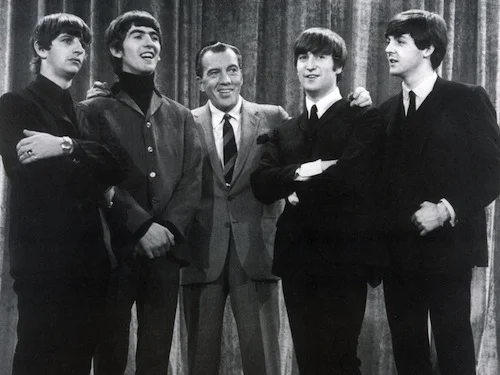However we hit it, we’re usually all happy by the time we finish the Doxology. No matter how we started, we end in gladness. Singing that poem of praise with these people has lifted my fog or funk or fatigue. We may yet find snark during our meal. One or more of the boys may yet complain or provoke or chew with his mouth open and get a rebuke. The preschooler may yet take my coveted last piece of bread for himself. The baby will undoubtedly throw something gleefully on the floor. But we’ve begun with thanksgiving, which is the least we can do.
All in Music
Finding Voice
When I place a record on the turntable, something in me slows down. It simply will not do to continue the multitasking that consumes most of my days and some of my nights. This is not background music for grading; it is an experience. I must listen. And as I listen, the experience threads its way into the busyness of my everyday. As I listen, the crackle and hiss of the turntable’s voice lets me into the wild soul of the music.
Song Dedications
Who am I to say how or when God communicates, or what a DJ has to do with the divine? But maybe this is the way of God, to hover over the surface of the waters, to speak something new into being. To speak something new when all is dark and cold, something that will penetrate the opaque substance of hull or hill or heart.
The Cost of Making a Great Record
This career is something I’m called to. It’s fulfilling, hard, rewarding, and scary sometimes, but I can’t see myself doing anything else right now. Unto Us was a labor of love. I’m so proud of the musical moments we created in the studio, and I love imagining thousands of families creating Christmas memories with my music as a soundtrack.
On Honest Art
For a day we considered our deepest disposition, sons of Adam and daughters of Eve that we are: we compartmentalize, we believe one thing to be true and behave as if another thing is true, we say “This matters most!” and then live as if it doesn’t really. This tendency has profound implications, for learning, for labor, for love, for liturgy—for all of who we are, for all of how we live.
How do we begin to find our way to coherence? Can we even imagine a way of seeing and hearing that honestly connects what we believe with the way that we live?
On Taking a Band Break, Comedic Short-Story Song Writing, and Grandma Carolee: Brooke Waggoner Interviews Kelsey Kopecky
As a writer in the past I’ve been like, “Okay, how can I say this message and encrypt it in this level of poetry that sounds interesting for the sake of poetry?” But ever since picking up an electric guitar, my music is sounding so much like when I’m on the phone with my best friend Laura telling her things about Minneapolis where I grew up—songs that are trying to say what I want to say but you talk too much type of lyric. I would have never written that before because I would have thought it isn’t poetry.
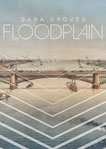 It isn’t normal for a drummer to call an artist and say, “I’m going to play on your next album, and we are going to do it like this.” He and Matt Pierson (the gift of studio time was for the two of them) were very gentle and careful the way they went about it, and so I was able to get into a different place. What would I write if I wasn’t thinking about audience and due dates? I really wanted to lean into being a songwriter, taking the craft seriously. I wanted to write from a more intuitive place. Writing is never easy for me, but it did help to have this wide-open invitation to write whatever I wanted.
It isn’t normal for a drummer to call an artist and say, “I’m going to play on your next album, and we are going to do it like this.” He and Matt Pierson (the gift of studio time was for the two of them) were very gentle and careful the way they went about it, and so I was able to get into a different place. What would I write if I wasn’t thinking about audience and due dates? I really wanted to lean into being a songwriter, taking the craft seriously. I wanted to write from a more intuitive place. Writing is never easy for me, but it did help to have this wide-open invitation to write whatever I wanted.
Advent: Calling the Dreamers and Realists, Prophets and Pragmatists
Advent is the time when longing and unmet desires meet celebration and fulfillment, holding the two ends of the spectrum of our human experience in tension without denying either of them. Grief and hope, pain and joy together. Because honestly, how often are we not feeling both simultaneously in some way?
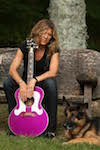 I am contemplative and introverted. I am tactile and love to make things. These are all catalysts for articulating my individuality. I am also an alcoholic, a drug addict, an egomaniac with an inferiority complex and an emotional lightning rod. These things do not supply my identity either, though they are as much a part of me as the traits I cherish. And I am equally grateful for them because the helplessness they triggered ushered me further into dependence on God and finding my place on the path, one step at a time.
I am contemplative and introverted. I am tactile and love to make things. These are all catalysts for articulating my individuality. I am also an alcoholic, a drug addict, an egomaniac with an inferiority complex and an emotional lightning rod. These things do not supply my identity either, though they are as much a part of me as the traits I cherish. And I am equally grateful for them because the helplessness they triggered ushered me further into dependence on God and finding my place on the path, one step at a time.
 Like committing crummy jokes to memory, remembering is intentional, the discovery of great gain in contentment. Where the debris of spilled baggage reaches its angle of repose, the place where physical objects come to rest along an incline (to borrow from Wallace Stegner), there is rest from the near-constant onslaught of shame, of striving to be enough, to make ourselves worthy, to, in effect, make gods of ourselves. And maybe not being enough is a healthy place to be, a place where God is good and is enough, all the time.
Like committing crummy jokes to memory, remembering is intentional, the discovery of great gain in contentment. Where the debris of spilled baggage reaches its angle of repose, the place where physical objects come to rest along an incline (to borrow from Wallace Stegner), there is rest from the near-constant onslaught of shame, of striving to be enough, to make ourselves worthy, to, in effect, make gods of ourselves. And maybe not being enough is a healthy place to be, a place where God is good and is enough, all the time.
Beginning Violin: On the Joy of Opting in to Failure
The violin has forced me out of my cubicle into a world without muscle memory or transferable skills. Everything is a battle. My hand cramps holding the bow. C sharp never sounds quite the same in the second measure as in the first. I can’t tune without my teacher’s trained ear. It is humbling to arrive on Irene’s doorstep having made no progress from the previous Tuesday. The opportunities for me to fail on the violin are daily and infinite.
Talking About God in Public
Out of belief comes life and all its attending stories. I have, over the last ten years deliberately chosen to keep some of these stories quieter or even private. Other than a few interviews and the occasional post here and there, I’ve required of myself what I’ve so often hoped for from others — a little reserve, maybe even silence. And so, on the topics of God, People, and Place — interdependent topics I’m very passionate about — I had gone mostly quiet.
 It was the hardest assignment I’ve ever been given. It had to be a certain length. It had to work musically with the tone of the visuals. It had to comment on what was going on onscreen without describing it, so it had to add subtext. I loved the challenge, and I’m still really happy with the final product. Auden claimed to have written a poem in every meter style that had ever existed. And if someone came up with one he hadn’t heard of before, he’d write it down and try to create a new poem in that meter. Pure craft, right?
It was the hardest assignment I’ve ever been given. It had to be a certain length. It had to work musically with the tone of the visuals. It had to comment on what was going on onscreen without describing it, so it had to add subtext. I loved the challenge, and I’m still really happy with the final product. Auden claimed to have written a poem in every meter style that had ever existed. And if someone came up with one he hadn’t heard of before, he’d write it down and try to create a new poem in that meter. Pure craft, right?
 Don’t be surprised if you’re making bad art. Don’t be discouraged. And whatever you do, don’t stop. Keep making bad art. Not because you’re wrong about your self-evaluation — you might be producing some really awful stuff. But just because the thing you’re working on is a ripe mess doesn’t necessarily mean it’s time to stop working. On the contrary, that might be both the worst time and reason to quit. I think you need to make bad art in order to make anything better. I know that’s been the case for me.
Don’t be surprised if you’re making bad art. Don’t be discouraged. And whatever you do, don’t stop. Keep making bad art. Not because you’re wrong about your self-evaluation — you might be producing some really awful stuff. But just because the thing you’re working on is a ripe mess doesn’t necessarily mean it’s time to stop working. On the contrary, that might be both the worst time and reason to quit. I think you need to make bad art in order to make anything better. I know that’s been the case for me.
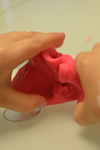 As much as motherhood has taken away — time to write, the ability to practice the piano without little hands taking over the keyboard ("Scooch, Mama”), the mental acuity to use polysyllabic words (or, some days, to finish sentences) — it has given me more. I have not lost myself in motherhood, as I had feared, but discovered myself. I don't just mean I've realized the beauty and joy of being a mother, but in and through motherhood I've grasped new ways of being creative. I learn creativity from my children, who are infinitely the same as and different from me; I learn creativity through my desire to create for them; I learn creativity simply by opening myself up to being something else.
As much as motherhood has taken away — time to write, the ability to practice the piano without little hands taking over the keyboard ("Scooch, Mama”), the mental acuity to use polysyllabic words (or, some days, to finish sentences) — it has given me more. I have not lost myself in motherhood, as I had feared, but discovered myself. I don't just mean I've realized the beauty and joy of being a mother, but in and through motherhood I've grasped new ways of being creative. I learn creativity from my children, who are infinitely the same as and different from me; I learn creativity through my desire to create for them; I learn creativity simply by opening myself up to being something else.
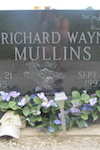 I used to desire, more than anything, to be useful to God. To be a good Christian. To change the world for Christ. To burn with the prophetic fire that lit Rich Mullins. But when my good works turned to ashes in my hands, I learned for the first time how precious it was to be wanted by God, apart from any usefulness I might have. Rich fought hard to grasp this lesson, and maybe if I’d been listening better I could have learned it from him while he was alive, but I doubt it: I had to fight for it on my own.
I used to desire, more than anything, to be useful to God. To be a good Christian. To change the world for Christ. To burn with the prophetic fire that lit Rich Mullins. But when my good works turned to ashes in my hands, I learned for the first time how precious it was to be wanted by God, apart from any usefulness I might have. Rich fought hard to grasp this lesson, and maybe if I’d been listening better I could have learned it from him while he was alive, but I doubt it: I had to fight for it on my own.
 It was a few weeks into the class that I suddenly felt as though I was in the ocean, treading water with seasoned and well-equipped scuba divers. The language was the water surrounding me, warm and inviting, salty and buoyant but dark below. It was the darkness that drew me. As much as I tried to get in touch with the text, with the loss of Eden, I felt drawn to the darkness below and I swam in that.
It was a few weeks into the class that I suddenly felt as though I was in the ocean, treading water with seasoned and well-equipped scuba divers. The language was the water surrounding me, warm and inviting, salty and buoyant but dark below. It was the darkness that drew me. As much as I tried to get in touch with the text, with the loss of Eden, I felt drawn to the darkness below and I swam in that.
Becoming a Songwriter, Part 3
Whether you believe you have a soul, a personality, or that you are a random blip in a succession of universes, within your person is the very you of you. I’m describing the you that is only you and no one else on the planet. You know you’re not me or your sister or brother. You are you. You have a mind and emotions that feel, think, and imagine. You have a body that has mobility and senses. You have a gender. You’re able to communicate in a number of ways — non-verbally through expressions, with language, with your whole body, and of course with music. Creativity, and specifically songwriting, ought to be the natural outworking of the whole person simply being what he or she is, human.
Becoming a Songwriter, Part 2
The power of place cannot be underestimated. This is why artists leave one place and move to another. The new place likely comes with a story—a story that tells the artist, “If you want to be a songwriter, this is the place to do it. This is the place that others have done the very thing you want to do. This is a place rich in stories — it’s a history-making place.” When young songwriters tell me they are moving to Nashville, it’s not because of the Tennessee Titans or our famous meat and three cuisine.
Places, and the people that inhabit places, are never neutral in what they give birth to. People and place are meaning makers.
Becoming a Songwriter, Part 1
I think this is the way it must be. Every musical child born into the music of a people and place must also hear and see music done by others outside your immediate circle. There must be some heroic figure (and hopefully several) that inspire the young musical person to imagine himself or herself doing that thing, or something similar — essentially, making something. Saying in your energized imagination and will, “I want to make that. I will make that.”


























